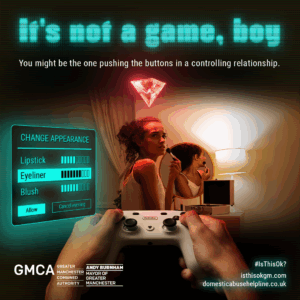
Behaviour Change Programmes
Helping you to stop causing harm in your relationships.

After losing everything Jason took part in TLC's behaviour change programme.
When a new member joins the group, he introduces himself to the other men by sharing the most abusive thing he’s done.
“Mine was screaming and shouting in front of my kids,” Jason, 38, says. “Letting my children witness that behaviour.”
The dad from Oldham, whose name has been changed to protect his family’s anonymity, has now completed a 40-week course. But when social services first referred him to the programme after concerns were raised about his children in school, he refused to go. Police then got involved, a court order was issued and he had to leave the family home. After losing everything, he changed his mind.
What he realises now, as he comes to the end of the Bridging to Change programme, is that his behaviour towards his now ex-wife was abusive – and it was affecting their children. “We were arguing and screaming and shouting all the time in front of the kids,” he explains.
"The kids were seeing that. It must have been stressful for them and upsetting. You're oblivious to it at the time. But our children shouldn't have to witness that."Jason, Behaviour Change Participant
Jason is among hundreds of men to take part in the programme run by a charity in Trafford. It is a project which appears to have proven effective so far. Research commissioned by the Home Office has found an 80 per cent reduction in reports of domestic abuse relating to those who take part. Most referrals to the programme come from social services while a quarter of participants since 2023 have been self-referred.
It comes as the Greater Manchester Combined Authority raise awareness of coercive and controlling behaviour through their #IsThisOk campaign which is part of a wider strategy to tackle gender-based violence in the region. Greater Manchester Police also want to see more perpetrators take part in these programmes and the force is now lobbying the government to allow courts to mandate participation in these courses.

But according to Bonnie Webster who works at TLC: Talk, Listen, Change in Trafford which runs the course, it’s not for everyone. “If we had a person who comes in and isn’t able to think they’ve done anything wrong at all, we wouldn’t really be able to work with them,” she says. “It’s really important that it is voluntary so they have a motivation to change whether that’s a motivation to be a better role model for their kids, a better partner, whatever it is.”
For Jason, who eventually agreed to take part in the programme after being re-referred, it was all about his children. Between them, Jason and his now ex-wife have four kids. When their relationship broke down, the kids stayed with their mum. “That was the most heartbreaking thing ever,” Jason says, “to spend all your time with your family and then for it to go to just yourself. To be fair, it broke my heart when I thought about it, that they were affected by it. Because you don’t think like that.”
“You don’t think your kids are being affected by it. But really it probably affects them more than it affects yourself.”
After ten one-to-one sessions, participants in the programme meet as a group, usually over video call, for two hours every week. The aim is to help participants understand their emotions and the impact of their actions on other people, including their children.
According to Bonnie, there are some drop outs – but those who stay take part in something ‘amazing’. “When we have new members of the group everyone so openly will be like, ‘hiya, this is me, this is what I’ve done, this is the most serious thing I’ve done’,” she explains.”That I think is amazing – a group of guys just being able to be so open about how they feel about things they’ve done.”
Detective Superintendent Jen Tattersall, who leads GMP’s Sex Offender Management Unit, says perpetrator programmes have a ‘strong role’ to play in the way the force handles domestic abuse.
"They're really important because the early intervention for domestic abuse relies on having a really strong perpetrator programme in place so it stops that domestic abuse in its tracks right from the start," she says."It also has a really strong role to play in more high-harm, repeat offending against victims because by using protective orders to help support them and stop that offending, having perpetrator programmes as an option in those orders is a real positive. We have seen some of those offenders do take that offer."Detective Superintendent Jen Tattersall
GMP now wants the government to give the courts the power to make participation in these programmes mandatory when they issue Domestic Abuse Protection Orders (DAPOs). The new type of protective order, which is being trialled in Greater Manchester, allows judges to include positive requirements such as an electronic monitoring tag or participation in a perpetrator programme, as well as prohibiting contact with the victim for an unlimited period of time. However, as it stands, perpetrators must consent to any positive requirements – and in the absence of an interim order under the DAPO regime, the case must be adjourned to allow for an assessment before a referral to a programme takes place.
If you are worried about your behaviour, please enquire about our Behaviour Change Programmes.

Helping you to stop causing harm in your relationships.

Learn how else our work has a significant impact

Gemma shares her story, after experiencing violent behaviour from her daughter.